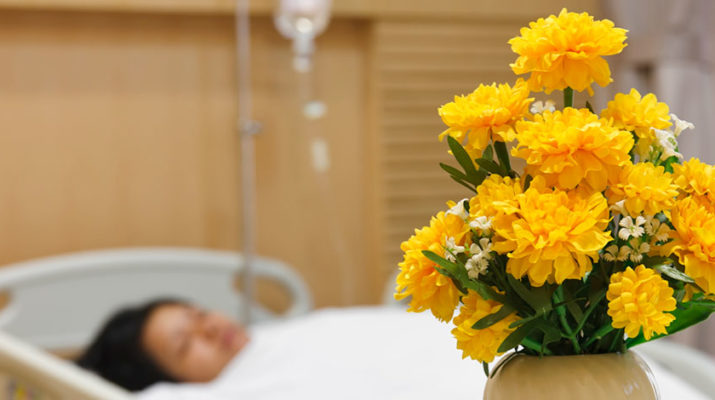Local providers agree: Plants, flowers have positive effect on hospital patients
By Deborah Jeanne Sergeant
Do you know someone who’s ill or injured? If you’re going for a visit, chances are you’ll likely bring along a gift as good manners.
But taking a bouquet or plant to a friend admitted to the hospital or recuperating at home is more than just a thoughtful gesture. A gift of flowers may actually help the patient get better.
A study by the American Society for Horticultural Science indicates that post-surgery patients between age 19 and 60 recovering in 40 hospital rooms with 12 plants and flowers had measurably lower blood pressure and heart rates than the 40 patients in control rooms with no plants or flowers.
Patients with foliage also reported less pain, reduced need for pain relievers and lower levels anxiety, plus greater patient satisfaction rates than the control rooms that were identical in every way, including the rooms’ views, except for the lack of plants. The patients were aware that the study provided the plants and flowers.
“It’s the endorphins,” said Debra Stacey, psychiatric nurse practitioner at WNY Medical, PC in Buffalo. “You find that with animal therapy and exercise. If you took a book and show people pictures of puppies and kittens, you can measure the endorphins in the brain. Looking at the flowers brings them pleasure.”
Many studies indicate access to nature as beneficial to patients, such as a hospital window facing a park, photos of peaceful nature scenes or even viewing the color green.
“We’ve seen some indications that the more contact with nature we have, the better we do mental health-wise,” said Timothy William Logsdon, licensed mental health counselor with Inner Quest Counseling Services in Amherst and Tonawanda. “Physical health and mental health are tied together.”
Flowers also boost both the decor and patient mood.
“Flowers represent hope, beauty and inspiration,” Logsdon said. “Hospitals are cold and sterile to begin with, so something to make them alive is a good thing.”
Flowers in a hospital room could provide another means for patients to connect with nature since going for a walk won’t work for most patients.
“It’s a healing environment that brings relaxation,” said Shawn Marie Cichowski, professional coach with a Bachelor of Arts degree in psychology and sociology and owner of WNY Life Coaching Center in Williamsville and East Aurora. “It’s a natural element, bringing the earth in the room. It’s part of our DNA to connect with the earth. When we get back to healing environments, it helps the body heal and recover.”
For some patients, they felt better connected to the outside world beyond their four hospital walls and to the people who placed the flowers in their room.
The study’s abstract said that the flowers provided “effective positive distraction, which may provide ample involuntary attention, increase positive feelings, block or reduce worrisome thoughts and promote restoration from stress.”
Though the participants in the American Society for Horticultural Science were aware that they received their flowers as part of a study, the presence of the bouquets and plants seemed to make the patients’ rooms feel special, which can provide a powerful emotional benefit. Patients allergic to flowers may still benefit from images depicting nature, like a card with flowers on it or a gift like balloons, stuffed animals or cards.

